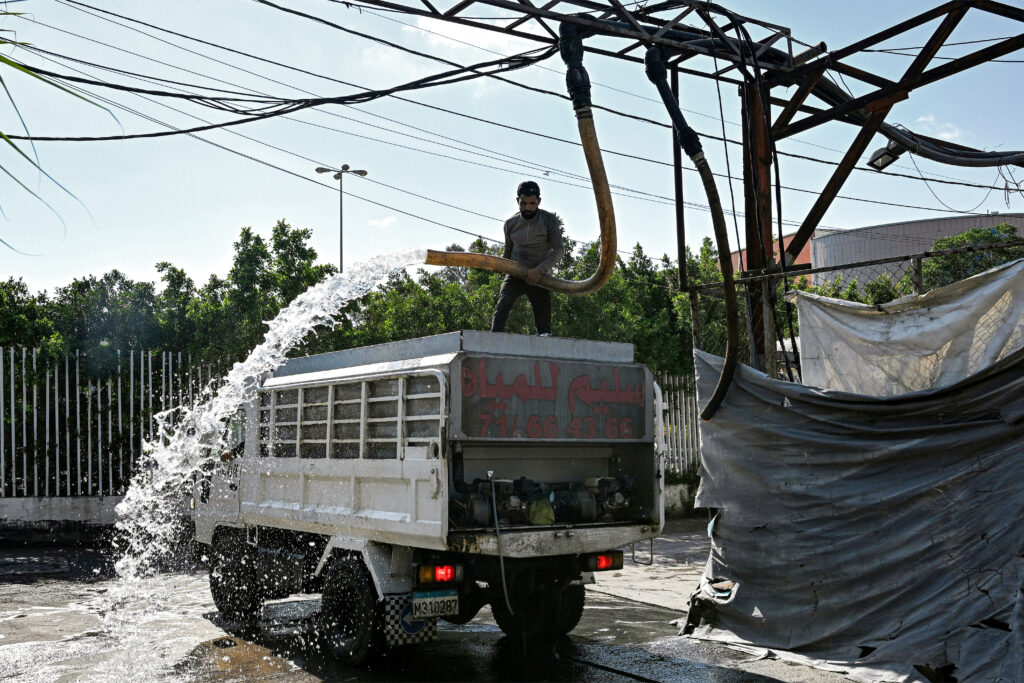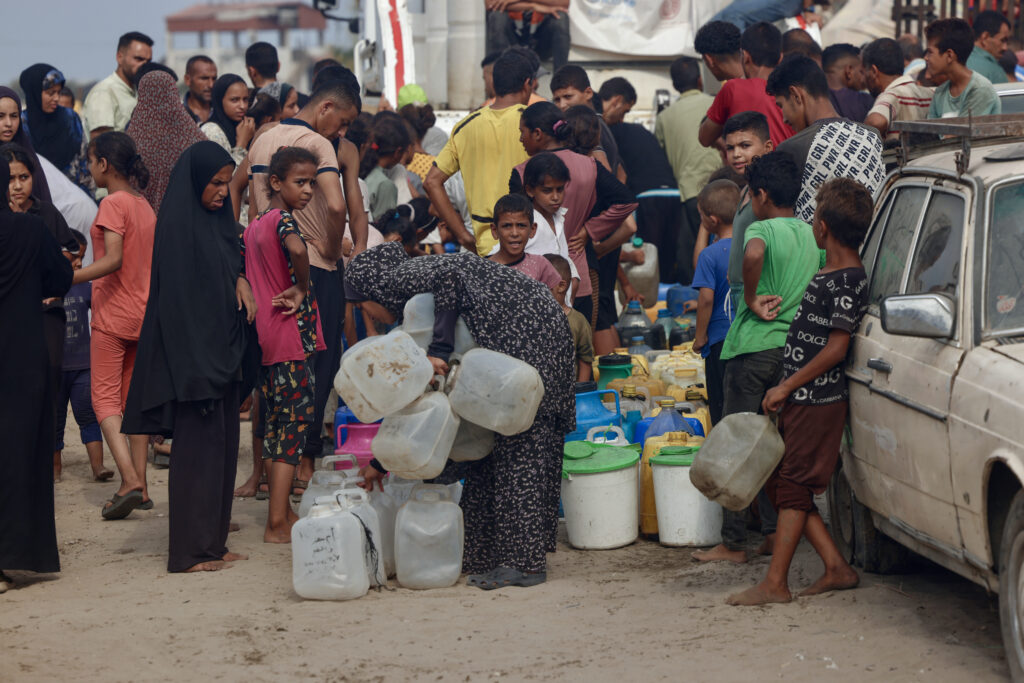AFP Asia Business
Water shortages plague Beirut as low rainfall compounds woes
People are buying water by the truckload in Beirut as the state supply faces its worst shortages in years, with the leaky public sector struggling after record-low rainfall and local wells running dry. “State water used to come every other day, now it’s every three days,” said Rima al-Sabaa, 50, rinsing dishes carefully in Burj al-Baranjeh, in Beirut’s southern suburbs.Even when the state water is flowing, she noted, very little trickles into her family’s holding tank.Once that runs out, they have to buy trucked-in water — pumped from private springs and wells — but it costs more than $5 for 1,000 litres and lasts just a few days, and its brackishness makes everything rust.In some areas, the price can be twice as high.Like many Lebanese people, Sabaa, who works assisting the elderly, relies on bottled water for drinking. But in a country grappling with a yearslong economic crisis and still reeling from a recent war between Israel and Hezbollah, the costs add up.”Where am I supposed to get the money from?” she asked.Water shortages have long been the norm for much of Lebanon, which acknowledges only around half the population “has regular and sufficient access to public water services”.Surface storage options such as dams are inadequate, according to the country’s national water strategy, while half the state supply is considered “non-revenue water” — lost to leakage and illegal connections.This year, low rainfall has made matters even worse.Mohamad Kanj from the meteorological department told AFP that rainfall for 2024-2025 “is the worst in the 80 years” on record in Lebanon.Climate change is set to exacerbate the county’s water stress, according to the national strategy, while a World Bank statement this year said “climate change may halve (Lebanon’s) dry-season water by 2040”.- Rationing -Energy and Water Minister Joseph Saddi said last week that “the situation is very difficult”.The shortages are felt unevenly across greater Beirut, where tanks clutter rooftops, water trucks clog roads and most people on the ramshackle state grid lack meters.Last month, the government launched a campaign encouraging water conservation, showing dried or depleted springs and lakes around the country.North of the capital, levels were low in parts of the Dbayeh pumping station that should have been gushing with water. “I’ve been here for 33 years and this is the worst crisis we’ve had for the amount of water we’re receiving and can pump” to Beirut, said the station’s Zouhair Azzi.Antoine Zoghbi from the Beirut and Mount Lebanon Water Establishment said water rationing in Beirut usually started in October or November, after summer and before the winter rainy season.But this year it has started months early “because we lack 50 percent of the amount of water” required at some springs, he told AFP last month.Rationing began at some wells in June, he said, to reduce the risk of overuse and seawater intrusion.Zoghbi emphasised the need for additional storage, including dams.In January, the World Bank approved more than $250 million in funding to improve water services for greater Beirut and its surroundings.In 2020, it cancelled a loan for a dam south of the capital after environmentalists said it could destroy a biodiversity-rich valley.- Wells -In south Beirut, pensioner Abu Ali Nasreddine, 66, said he had not received state water for many months.”Where they’re sending it, nobody knows,” he said, lamenting that the cost of trucked-in water had also risen.His building used to get water from a local well but it dried up, he added, checking his rooftop tank.Bilal Salhab, 45, who delivers water on a small, rusted truck, said demand had soared, with families placing orders multiple times a week.”The water crisis is very bad,” he said, adding he was struggling to fill his truck because wells had dried up or become salty.In some areas of greater Beirut, wells have long supplemented or even supplanted the state network.But many have become depleted or degraded, wrecking pipes and leaving residents with salty, discoloured water.Nadim Farajalla, chief sustainability officer at the Lebanese American University, said Beirut had ballooned in size and population since the start of the 1975-1990 civil war but water infrastructure had failed to keep up.Many people drilled wells illegally, including at depths that tap into Lebanon’s strategic groundwater reserves, he said, adding that “nobody really knows how many wells there are”.”Coastal aquifers are suffering from seawater intrusion, because we are pumping much more than what’s being recharged,” Farajalla told AFP.As the current shortages bite, rationing and awareness campaigns should have begun earlier, he said, because “we all knew that the surface snow cover and rainfall” were far below average.
Israeli military says approved plan for new Gaza offensive
The Israeli military said on Wednesday that it had approved the framework for a new offensive in the Gaza Strip, as Hamas condemned what it called “aggressive” Israeli ground incursions in Gaza City.The approved plan for the expanded offensive comes days after Israel’s security cabinet called for the capture of the Palestinian territory’s largest city following 22 months of war that have created dire humanitarian conditions.Israeli armed forces chief Lieutenant General Eyal Zamir “approved the main framework for the IDF’s operational plan in the Gaza Strip”, a statement released by the army said. Prime Minister Benjamin Netanyahu’s government has not provided a precise timetable for when Israeli troops will enter Gaza City, where thousands have taken refuge after fleeing previous offensives.Ismail Al-Thawabta, director general of the Hamas government media office in Gaza, told AFP on Wednesday that “the Israeli occupation forces continue to carry out aggressive incursions in Gaza City”. “These assaults represent a dangerous escalation aimed at imposing a new reality on the ground by force, through a scorched-earth policy and the complete destruction of civilian property,” he added.Sabah Fatoum, 51, who lives in a tent in the city’s Tal al-Hawa neighbourhood told AFP by phone that “the explosions are massive” in the area.There are “many air strikes and tanks are advancing in the southern area of Tal al-Hawa with drones above our heads”, she said.Abu Ahmed Abbas, 46, who lives in a tent in the Zeitoun neighbourhood, said that tanks had been advancing into the southeastern part of Zeitoun and southern Tal al-Hawa “for several days” and demolishing houses.”The air strikes are extremely intense, they have intensified, and sometimes there is artillery shelling since last Sunday,” he said. – ‘Just escaped death’ -Gaza’s civil defence agency also reported intensified Israeli air strikes on residential neighbourhoods of Gaza City in recent days. Agency spokesman Mahmud Bassal told AFP that Israeli attacks had killed at least 75 people across the territory on Wednesday.AFP footage from Gaza City on Tuesday showed Palestinians fleeing Israeli strikes on the Zeitoun and Asqoola neighbourhoods using overloaded carts, vans and bikes. “I didn’t bring a mattress or anything, and we just escaped death and now we’re running away and we don’t know where to go,” said displaced Palestinian Fidaa Saad.Israel’s plans to expand its offensive into Gaza City come as diplomacy aimed at securing an elusive ceasefire and hostage release deal has been stalled for weeks, with the latest round of negotiations breaking down in July.Egypt said Tuesday it was still working with fellow Gaza mediators Qatar and the United States to broker a 60-day truce “with the release of some hostages and some Palestinian detainees, and the flow of humanitarian and medical assistance to Gaza without restrictions”.Hamas said early Wednesday that a senior delegation had arrived in Cairo for “preliminary talks” with Egyptian officials.Israel’s plans to expand the fighting have sparked international outcry as well as domestic opposition.Reserve and retired pilots who served in the Israeli air force rallied on Tuesday in Tel Aviv to demand an end to the conflict.”This war and expansion will only cause the death of the hostages, death of more Israeli soldiers, and death of many more innocent Palestinians in Gaza,” said Guy Poran, a former air force pilot. – Dire conditions -UN-backed experts have warned of widespread famine unfolding in the territory, where Israel has drastically curtailed the amount of humanitarian aid it allows in.The health ministry in Hamas-run Gaza says at least 235 people including 106 children have died of hunger since the war began in October 2023, with many of the cases recorded in recent weeks.Netanyahu on Tuesday revived calls to “allow” Palestinians to leave Gaza, telling Israeli broadcaster i24NEWS that “we are not pushing them out, but we are allowing them to leave”.Past calls to resettle Gazans outside of the war-battered territory, including from US President Donald Trump, have sparked fears of displacement among Palestinians and condemnation from the international community.Hamas’s October 2023 attack on Israel that triggered the war resulted in the deaths of 1,219 people, according to an AFP tally based on official figures.Of the 251 hostages taken during the attack, 49 are still held in Gaza, including 27 the Israeli military says are dead. Israel’s offensive has killed at least 61,722 Palestinians, according to figures from the health ministry in Gaza which the United Nations considers reliable.


